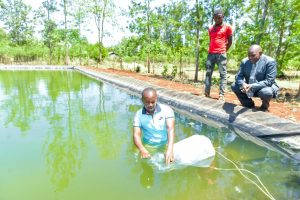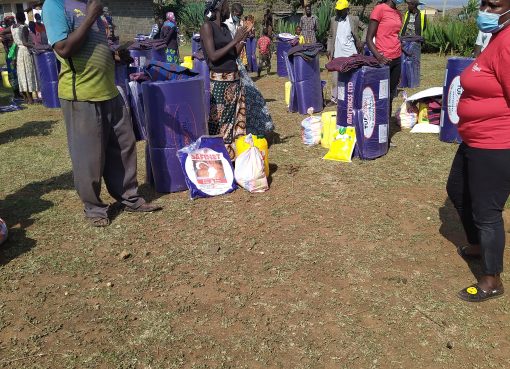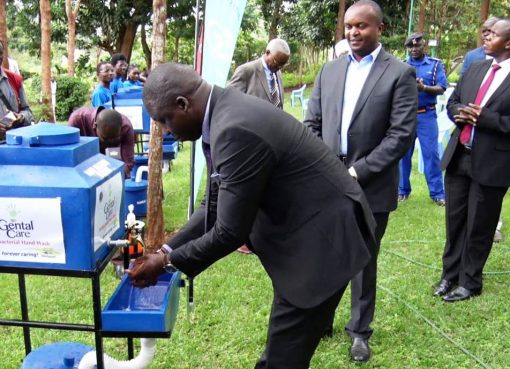Kirinyaga County Government has distributed 254,000 fish fingerlings to farmers to boost fish production in the wake of increased consumption in Mt. Kenya region.
The fingerlings that were given out to 254 farmers, each of them receiving 1,000, are part of the county’s elaborate plan to empower farmers to undertake aquaculture as a mainstream activity as opposed to having it as an alternative source of livelihood.
To create a market for the expected bumper harvest of fish in the near future, the County Government will be putting up an exclusive fish market at Kiaga in Ndia Constituency, where farmers will be aggregating their produce for sale.
For the past three years, fish farming in the county has been growing gradually under the county’s Wezesha Kirinyaga economic empowerment program initiated by Governor Anne Waiguru.
“Fish farming will provide extra income for our farmers and give direct support to women and youth who will be involved at various stages of the project value chain,” said Governor Waiguru.
She noted that aquaculture would bridge the huge deficit of fish supply both within and outside Kirinyaga since half of the fish produced in Kenya comes from aquaculture while the other half is from ocean and lake fishing.
Waiguru said that one of the processing factories that will be set up in the upcoming Sagana Industrial Park will deal in fish processing, hence the importance of having locally available raw material. Fish farmers will thus gain further from value addition of their produce.
She said that her vision is to see Kirinyaga get a fair share of fishing potential given that it is endowed with favorable aquaculture conditions, which include fresh water and ready market. Adding that she is working towards increasing annual fish production from the current 29.4 tons valued at Sh12.8 million to 62 tons, which will fetch the farmers around Sh30 million per year.
Under the fisheries program, the county government has been supporting farmers by providing them with free fishpond liners, fingerlings and six months fish feed.
The farmers on the other hand construct the fishponds and thereafter nurture the fish to maturity. They then use the proceeds from the first harvest to restock their ponds with more fingerlings in order to sustain the project.
While distributing the fingerlings to the farmers, the County Executive Committee member for Agriculture, Livestock and Fisheries, Dr. John Gachara, said that the first phase of the aquaculture program in Kirinyaga was launched in 2019 where farmers who were supported then were able to produce fish independently.
He said that the ongoing phase is supporting beneficiaries at different stages of the aquaculture value chain with a total of 1,352 Level One farmers who have been producing less than 100 kilograms of fish annually are being supported to scale up production to commercial level.

At level two, 376 farmers who produce more than 100kgs annually will be supported with feed while six Level 3 farmers who are already commercial will benefit from marketing and extension services from the government.
The CEC pointed out that the youth have not been left out in the aquaculture program. A total of 207 young men and women have been trained and will be funded to set up enterprises such as fish eateries, fish transportation businesses including boda boda, fish farming inputs stores as well as fish feeds production cottage industries.
He noted that in order to streamline marketing of their produce, the fish farmers will be forming Smallholder Aquaculture Groups (SAGs) that will finally form Fish Farmers Cooperative Society.
A farmer Stanley Munene Muthigani from Kiini ward in Ndia constituency is a beneficiary of the project having received 1,000 fingerlings. He said that the project is going to be a game changer in the county’s agriculture since many farmers will be able to integrate it with other farming activities.
“Fish farming is a highly profitable venture that is not time consuming since once you have stocked your pond you will only be feeding your fish twice a day,” said Munene, adding that a kilogram of fish is currently selling at Sh400 at farm gate.
He added that commercial fish farming is also suitable for people with small parcels of land unlike other crops that may require acres for commercial production.
He thanked the county government for the support it has accorded to farmers to ensure that they increased production and reap profits in agriculture.
To popularize consumption and create awareness of the importance of incorporating fish as a preferred source of protein in line with improving the local community’s food security and nutrition, the county government will be organizing fish eating festivals whereby residents are taught various methods of cooking fish.
Fish farmers are also trained on how to utilize the land around the fish ponds to grow crops such as bananas and vegetables for domestic use or for sale.
Even though growing and consumption of fish has for a long time been considered a preserve of lakeside communities, the practice is gradually taking root away from lakes and oceans.
Kirinyaga was ranked number five during the National Aquaculture Annual Stakeholders Review meeting held a year ago in Kirinyaga.
The forum brought together representatives of the national government and county governments’ departments of Agriculture, Livestock and Fisheries, fish farmers and other stakeholders. The ranking was based on the implementation of the Aquaculture Business Development Program. (ABDP).
By Irungu Mwangi





